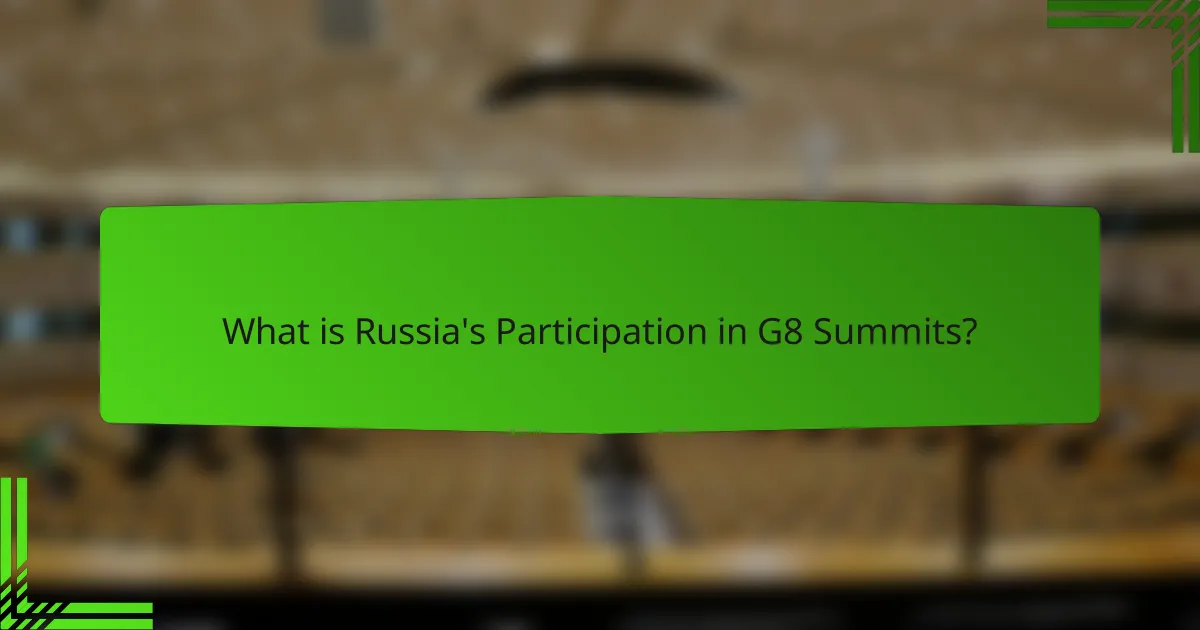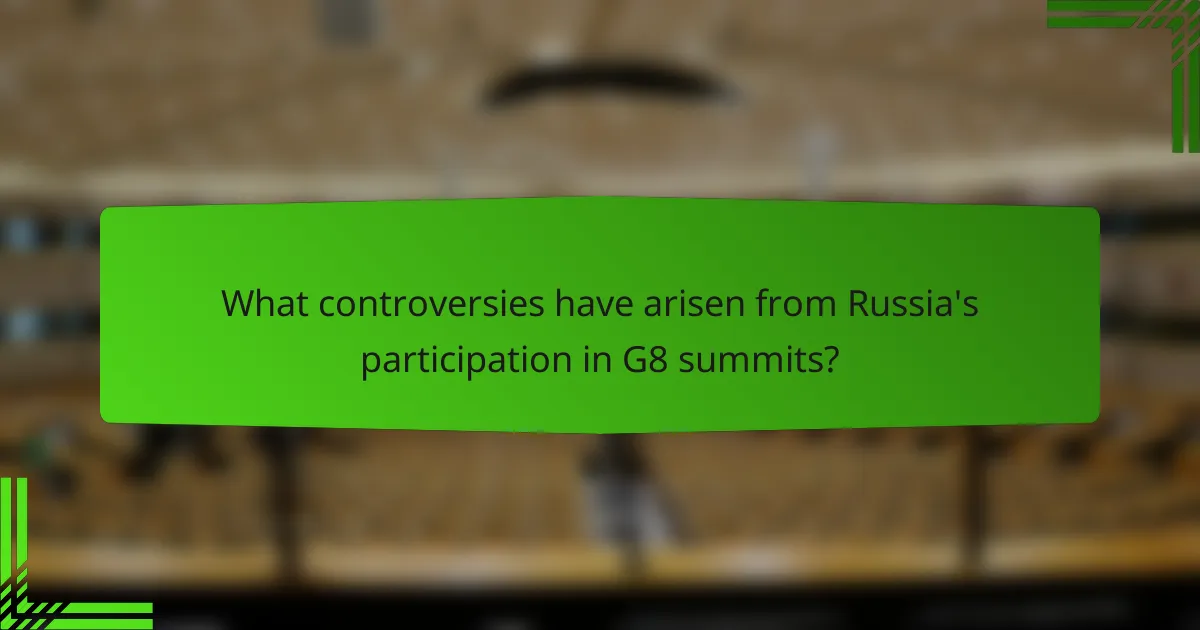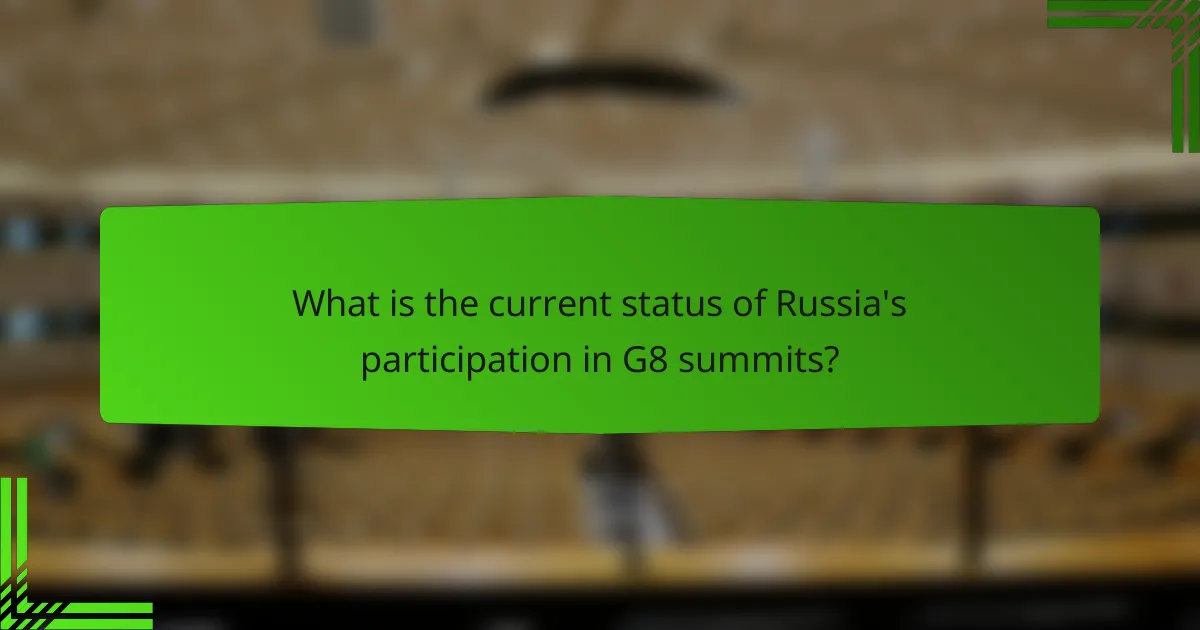Russia’s participation in G8 summits spanned from 1998 to 2014, initially aimed at integrating the country into global economic discussions following its market reforms post-Soviet Union. However, geopolitical tensions, particularly surrounding the annexation of Crimea in 2014, led to Russia’s suspension from the G8 and a reversion to the G7 format. This suspension highlighted significant controversies related to human rights issues and election interference, which have strained diplomatic relations between Russia and G7 nations. The article provides a historical overview of Russia’s involvement in G8 summits, the controversies that arose, and the current status of diplomatic relations within this context.

What is Russia’s Participation in G8 Summits?
Russia participated in G8 summits as a member from 1998 until 2014. Initially invited to join the group, Russia’s participation aimed to integrate it into global economic discussions. The inclusion was seen as a recognition of Russia’s market reforms post-Soviet Union. However, relations soured due to geopolitical tensions. The annexation of Crimea in 2014 led to Russia’s suspension from the G8. Consequently, the group reverted to the G7 format. This suspension reflected the international community’s response to Russia’s actions.
How did Russia become a member of the G8?
Russia became a member of the G8 in 1998. Initially, the G7 was formed in 1975, comprising Canada, France, Germany, Italy, Japan, the United Kingdom, and the United States. In 1997, Russia was invited to join the G7, transforming the group into the G8. This inclusion was a recognition of Russia’s significant political and economic reforms following the end of the Cold War. The decision aimed to integrate Russia into the global economic system and foster dialogue among major industrialized nations. Russia’s membership symbolized a shift towards cooperation and engagement in international affairs.
What were the key events leading to Russia’s inclusion in the G8?
In 1997, Russia was officially invited to join the G8, marking a significant shift in international relations. This invitation followed the end of the Cold War, which allowed for greater cooperation between Russia and Western nations. The 1990s saw Russia undergoing substantial political and economic reforms under President Boris Yeltsin. In 1994, Russia participated in the G7 summit as a guest, signaling its interest in joining the group. By 1997, the G7 leaders recognized Russia’s progress and invited it to become a full member. The decision was also influenced by the desire to integrate Russia into the global economy. Additionally, the 1998 financial crisis prompted discussions on the need for broader cooperation. Ultimately, these events culminated in Russia’s inclusion in the G8, reflecting a commitment to collaboration on global issues.
What role did global politics play in Russia’s entry?
Global politics played a crucial role in Russia’s entry into the G8. The end of the Cold War shifted global dynamics. Western nations sought to engage Russia as a partner. In 1997, Russia was officially invited to join the G8. This decision aimed to promote cooperation and stability. The G8 sought to integrate Russia into the global economy. Russia’s membership symbolized a new era of collaboration. The geopolitical landscape influenced this historic decision significantly.
What has been the historical significance of Russia’s presence in G8 summits?
Russia’s presence in G8 summits has historically signified its integration into global economic and political discussions. Joining the G8 in 1998 marked Russia’s recognition as a major player on the world stage. This inclusion aimed to foster cooperation on pressing global issues, such as terrorism and climate change. Russia’s participation also facilitated dialogue between Western nations and itself, especially during the post-Cold War era. However, its presence has been contentious, particularly regarding its human rights record and geopolitical actions. The annexation of Crimea in 2014 led to Russia’s suspension from the G8, highlighting the complexities of its role. Overall, Russia’s involvement has shaped discussions on global governance and international relations.
How have Russia’s contributions shaped G8 discussions?
Russia’s contributions have significantly shaped G8 discussions by introducing key geopolitical issues and economic perspectives. Russia emphasized the importance of energy security during its participation. This focus influenced discussions on global energy markets and sustainability. Additionally, Russia’s stance on counter-terrorism shaped collaborative efforts among member states. The inclusion of Russia provided a platform for addressing regional conflicts, particularly in the context of Eastern Europe and the Caucasus. Russia’s unique insights into post-Soviet dynamics offered a broader understanding of regional stability. The country’s contributions also prompted debates on human rights and governance, impacting the G8’s agenda. Overall, Russia’s involvement enriched the G8 discussions, making them more comprehensive and multifaceted.
What major agreements or initiatives involved Russia during its participation?
Russia participated in several major agreements and initiatives during its time in the G8. One significant initiative was the Global Partnership Against the Spread of Weapons and Materials of Mass Destruction, established in 2002. This partnership aimed to secure and eliminate weapons of mass destruction. Another key agreement was the G8 Action Plan on Climate Change, Energy Security, and Clean Development, adopted in 2005. This plan focused on addressing climate change and promoting sustainable energy solutions. Additionally, Russia was involved in the G8’s commitment to the Millennium Development Goals, which aimed to reduce global poverty and improve living standards by 2015. These agreements reflect Russia’s engagement in global security and development issues during its G8 participation.

What controversies have arisen from Russia’s participation in G8 summits?
Controversies surrounding Russia’s participation in G8 summits primarily stem from geopolitical tensions and human rights issues. Russia’s annexation of Crimea in 2014 led to its suspension from the G8, transforming the group into the G7. This action was widely condemned by other member nations, highlighting concerns over territorial integrity. Additionally, allegations of election interference and human rights abuses in Russia have caused friction during discussions. The G8 summits aimed to promote cooperation, but Russia’s actions have often been viewed as contradictory to the group’s principles. The differing perspectives on security and democracy have created ongoing debates among member states.
What criticisms have been directed at Russia’s involvement in the G8?
Criticisms directed at Russia’s involvement in the G8 include concerns over its democratic practices. Observers have pointed out issues such as media censorship and political repression. Additionally, Russia’s foreign policy actions have raised alarms. The annexation of Crimea in 2014 led to significant backlash from other G8 nations. Critics argue that Russia’s behavior undermines the G8’s commitment to democratic values. Economic sanctions were imposed as a response to these actions. The legitimacy of Russia’s membership has been questioned due to these controversies. Overall, these criticisms highlight a disconnect between Russia’s actions and the G8’s principles.
How has Russia’s foreign policy affected its reputation within the G8?
Russia’s foreign policy has significantly damaged its reputation within the G8. Actions such as the annexation of Crimea in 2014 led to widespread condemnation. This event resulted in Russia’s suspension from the G8, reverting it to the G7 format. The G7 members criticized Russia for violating international law and undermining Ukraine’s sovereignty. Additionally, Russia’s support for separatists in Eastern Ukraine further strained relations. The G8’s unity was challenged as member states grappled with differing views on Russia’s actions. Consequently, Russia’s standing as a cooperative global player diminished. The fallout from these foreign policy decisions has led to lasting tensions with G8 nations.
What specific incidents have sparked controversy during G8 meetings?
Controversial incidents during G8 meetings include the 2001 Genoa summit protests. These protests resulted in violence and the death of a protester. The 2014 Sochi summit faced backlash over Russia’s annexation of Crimea. This action led to the suspension of Russia from the G8. Additionally, the 2003 summit in Evian was marked by protests against the Iraq War. Such incidents highlight tensions surrounding global governance and national interests. The controversies often reflect broader geopolitical issues.
How has Russia’s participation impacted diplomatic relations with other G8 countries?
Russia’s participation in the G8 has significantly strained diplomatic relations with other member countries. This tension escalated notably after the annexation of Crimea in 2014. The United States and European nations responded by suspending Russia’s G8 membership. Consequently, the G7 format was reinstated without Russia. Diplomatic communications have been characterized by increased sanctions against Russia. These sanctions aimed to pressure Russia over its foreign policy actions. Additionally, Russia’s involvement in Syria further complicated its relations with Western nations. Overall, Russia’s participation has led to a clear divide in diplomatic engagement within the G8 framework.
What changes in diplomatic relations have occurred since Russia joined the G8?
Since Russia joined the G8 in 1998, diplomatic relations have fluctuated significantly. Initially, Russia’s inclusion was seen as a move towards integration with Western nations. The G8 aimed to foster collaboration on global issues, including security and economic development. However, tensions rose after events such as the 2008 war in Georgia. This conflict strained relations and led to criticism of Russia’s actions. The annexation of Crimea in 2014 further deteriorated diplomatic ties. As a result, G8 members suspended Russia’s participation, reverting to the G7 format. The shift reflects a broader geopolitical divide and ongoing disputes over international norms and territorial integrity.
How have tensions with Western nations influenced Russia’s standing in the G8?
Tensions with Western nations have led to a significant decline in Russia’s standing in the G8. In 2014, Russia’s annexation of Crimea prompted other G8 members to suspend its participation. This action was a direct response to perceived violations of international law. The suspension marked a shift from the G8 to the G7 format, excluding Russia. Prior to this, Russia had been integrated into the G8 since 1997, reflecting a desire for cooperation. However, escalating conflicts, such as military interventions and geopolitical disputes, strained relations. The G7 nations have since criticized Russia’s actions in Ukraine and Syria. Consequently, Russia’s influence in international discussions has diminished.

What is the current status of Russia’s participation in G8 summits?
Russia is currently suspended from participating in G8 summits. This suspension occurred in 2014 following Russia’s annexation of Crimea. The G8 group then reverted to the G7 format without Russia. The decision was made by the other member countries in response to Russia’s actions. Since then, Russia has not been invited to any G7 meetings. Diplomatic relations between Russia and G7 nations remain strained. The situation reflects ongoing geopolitical tensions.
Why was Russia suspended from the G8, and what were the implications?
Russia was suspended from the G8 in 2014 due to its annexation of Crimea. This action was deemed a violation of international law. The G8 members viewed Russia’s behavior as aggressive and destabilizing. As a result, the group reverted to the G7 format. The suspension marked a significant shift in diplomatic relations. It signaled a united stance against Russia’s actions among Western nations. The implications included increased sanctions on Russia and heightened geopolitical tensions. This situation also affected global economic discussions and cooperation.
What events led to the suspension of Russia from the G8?
Russia was suspended from the G8 in 2014. This action followed Russia’s annexation of Crimea. The annexation was widely condemned by the international community. It violated Ukraine’s sovereignty and territorial integrity. In response, G7 leaders decided to suspend Russia’s participation. This decision was made during a summit in Brussels. The G7 then continued as a group of seven nations without Russia. The suspension reflected broader geopolitical tensions between Russia and Western nations.
How has the G8 evolved since Russia’s suspension?
The G8 has evolved into the G7 since Russia’s suspension in 2014. The suspension followed Russia’s annexation of Crimea, which was widely condemned by other member nations. As a result, the remaining members decided to continue without Russia, focusing on shared economic and security interests. The G7 has since prioritized issues such as climate change, global health, and international security. Regular meetings have adapted to address emerging global challenges, including cybersecurity and trade tensions. The G7 leaders have reaffirmed their commitment to democratic values and international cooperation. This shift reflects a more unified stance among member nations against perceived threats. The G7 continues to engage with global partners, maintaining relevance in international diplomacy.
What are the future prospects for Russia’s involvement in global summits?
Russia’s future involvement in global summits is uncertain. Current geopolitical tensions limit its participation. Western nations have imposed sanctions and reduced diplomatic engagement with Russia. This has led to Russia being excluded from the G8, now the G7. Additionally, Russia’s military actions in Ukraine have further strained relationships with other countries. Future summits may continue to see Russia on the sidelines unless diplomatic relations improve. The effectiveness of Russia’s outreach to non-Western countries may play a role in its future summit participation. However, significant barriers remain due to ongoing international conflicts.
How might Russia’s diplomatic strategies influence its future participation?
Russia’s diplomatic strategies may significantly influence its future participation in international forums like the G8. These strategies involve forming alliances and leveraging economic partnerships. For instance, Russia has sought closer ties with countries like China and India. This shift could enhance its bargaining power in global discussions. Additionally, Russia’s approach to conflicts, such as its involvement in Syria and Ukraine, shapes its international reputation. The response from Western nations may lead to increased isolation or renewed engagement, depending on geopolitical dynamics. Historical context shows that Russia’s assertive foreign policy often leads to mixed outcomes in diplomatic participation. Therefore, its future involvement will largely depend on balancing these strategies with global perceptions and responses.
What alternative international forums is Russia engaging with post-G8?
Russia is engaging with several alternative international forums post-G8. These include the BRICS group, which consists of Brazil, Russia, India, China, and South Africa. Russia is also active in the Shanghai Cooperation Organization (SCO), focusing on security and economic cooperation in Eurasia. Additionally, Russia participates in the Eurasian Economic Union (EAEU), promoting regional economic integration. The Collective Security Treaty Organization (CSTO) is another forum where Russia collaborates on defense and security matters. These engagements reflect Russia’s shift towards multilateralism outside the G8 framework.
What lessons can be learned from Russia’s experience in G8 summits?
Russia’s experience in G8 summits highlights the complexities of international diplomacy. One lesson is the importance of consensus-building among member nations. Russia often faced challenges in aligning its interests with those of other G8 countries. Another lesson is the impact of geopolitical tensions on collaborative efforts. For instance, Russia’s actions in Ukraine strained relations, demonstrating how external conflicts can disrupt dialogue. Additionally, the experience underscores the necessity of adapting to changing global dynamics. Russia’s fluctuating engagement levels reflected its response to evolving international priorities. Finally, the need for transparent communication emerged as a key takeaway. Misunderstandings often arose from differing perspectives, emphasizing the value of open discussions.
How can nations navigate controversies in international collaborations?
Nations can navigate controversies in international collaborations by establishing clear communication channels. Transparency in intentions and actions helps build trust. Engaging in diplomatic dialogue allows for the airing of grievances. Compromise and flexibility are essential in negotiations. Multilateral forums can facilitate discussions among conflicting parties. Historical examples show that nations often resolve issues through back-channel negotiations. For instance, the G8 summits have addressed various disputes through consensus-building efforts. Effective conflict resolution strategies are vital for maintaining collaborative relationships.
What best practices can emerge from Russia’s participation in the G8?
Best practices that can emerge from Russia’s participation in the G8 include enhanced diplomatic engagement and multilateral cooperation. Russia’s involvement fosters dialogue on global issues such as security, climate change, and economic stability. The G8 platform promotes transparency and accountability among member nations. Collaborative initiatives can lead to shared solutions for international crises. Russia’s participation can also encourage investment in sustainable development projects. Regular communication among member states can strengthen trust and partnerships. Lastly, leveraging Russia’s unique geopolitical position can facilitate negotiations with non-member countries.
The main entity of the article is Russia’s participation in G8 summits. The article provides a historical overview of Russia’s membership from 1998 until its suspension in 2014 due to geopolitical tensions, specifically the annexation of Crimea. It discusses key events leading to Russia’s inclusion, its contributions to G8 discussions, and the controversies surrounding its involvement, including criticisms of its foreign policy and human rights record. Additionally, the article examines the implications of Russia’s suspension, the evolution of the G8 into the G7, and the current status of Russia’s diplomatic relations within international forums.